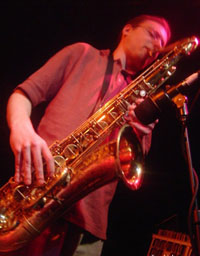
Jeff Sackmann is a composer, saxophonist, and bandleader with an embarrasing affection for bubblegum pop.
In an effort to create serious music for his 15-piece jazz orchestra, Oy Christina!, he has combined baroque fugue with Justin Timberlake, introduced serialism to Eminem, and spiced up dance mixes with Coltrane changes. For his trio Single White Female, among others, he has written several dozen pieces for small jazz ensemble that occasionally bridge the gap between chamber music and traditional combo playing.
As a saxophonist, Jeff spent several months performing with Clyde Stubblefield, the original funky drummer. He plays with a variety of rock bands in New York City and spent three years as the music director for the swing band Little Red and the Howlers.
Hailing originally from Spokane,Washington, he spent his undergraduate years at New York University, did graduate work in English Literature at the University of Wisconsin-Madison,and studied music at Berklee.
|

1.20.2006
Hello S21 World
I'm going to save the "this is who I am, this is what I do" post for a little while (maybe a long while--I've got to figure it out before I can tell you) and get the ball rolling with a concert review from last night. But before I do, I'd like to thank Jerry for setting up the blog and including me in the sprawling oasis of Sequenza 21, and extend my appreciation to everybody who contributes here.
Last night was the second of two Beata Moon-produced "composer=performer" concerts at the Thalia in Symphony Space. This one featured John King, Joan La Barbara, and Todd Reynolds performing their own works and collaborating with each other. While La Barbara and Reynolds are primarily known as performers, I was most excited about the chance to hear John King, who has gotten the most attention lately as a composer.
King performed the first set, and didn't disappoint. I've been a King fan since I first heard an Ethel performance of his string quartet "Sweet Hardwood," a piece that incorporates blues, roots, and improvisation without sounding in the slightest bit gimmicky. He introduced his set of four songs as "happy little tunes" incorporating "improvisation and randomization," and "also love songs." He played the first two on electric guitar, interacting with loops created by the laptop the guitar was connected to. Presumably this is where the "randomization" came in; a couple of times he chuckled in response to something that the machine spit out. The notated part of his songs were bluesy and rarely ventured beyond a pentatonic scale, making the resulting mishmash of guitar and layers of loops surprisingly tonal.
The third song was sung--again, more blues than anything else; a series of loops creating several layers until a recording of spoken voice from a tarot reading added another dimension. The final song he performed on violin with the same interactions. I was surprised just how consistent his sound is, whether as a composer for string quartet, or a performer with any of his chosen instruments.
Joan La Barbara presented "WoolfSong (Thalia Mix)," pieces of her opera in progress based on the life and work of Virginia Woolf. Intruigingly for a piece concerned with a prose writer, there were no discernible words until the very end of the twenty-minute performance. Accompanied by a recording of several instrumentalists, La Barbara relied on just a few vowel sounds to express a broad range of emotion.
In the final set of the evening, Todd Reynolds performed three of his works, each accompanied by recordings. Reynolds is a fantastic violinist and is becoming accomplished as a composer, but it was difficult to get past the oddity of a "solo violin" performance that sounded like a varied chamber music program. The first piece, "The Solution," is an arrangement of something he originally wrote for string quartet, and the accompanying recording is expanded to include even more voices than the quartet. Interesting piece, but I'd rather hear something that could be performed by those present.
Unfortunately, the concert ran a tad long (there was a post-concert wine tasting to get to, after all!) so the final two pieces on the program, improvisations by Reynolds and King followed by one with all three performers, were cut short. In the duet with Reynolds, King played violin--he's a fiddle player, providing an enormous contrast with Reynolds's style--and just as they were getting somewhere, they held to their promise to limit themselves to two minutes.
It's too bad that the three composers didn't have more music to play with each other--except for a very short solo violin piece of La Barbara's, each of the collaborations appeared to be an improvisation--but aside from that, the concert was not only a good one, but each performer gave us something to look forward to. La Barbara will be giving more concerts as she continues to develop her Woolf opera, Reynolds showed that he is continuing to develop as a composer, and King's inclusion, along with this concert at Tonic next week, indicates that we can expect to hear more from him as a performer as well.
posted by Jeffrey Sackmann
|
| |



